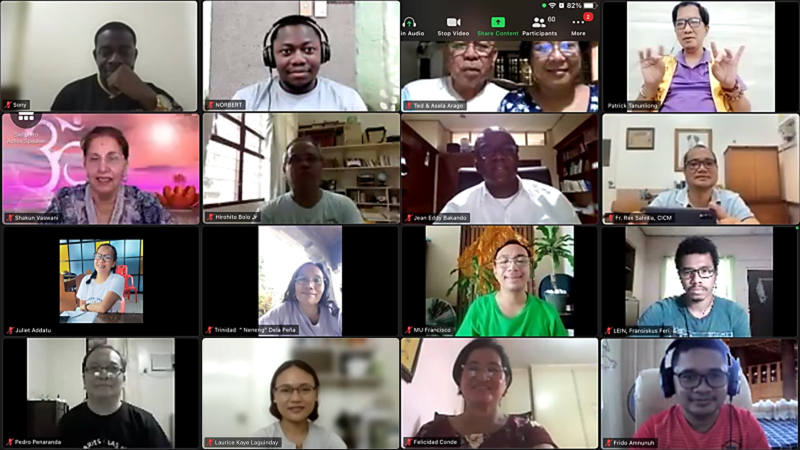On Interreligious Dialogue
by Ferdinand ‘Makoy’ Marcos and Genevieve Balance Kupang
Awakening the Self to an Awareness of the ‘Other’ and the Need for Dialogue
The Congregatio Immaculati Cordis Mariae (CICM) or Congregation of the Immaculate Heart of Mary in partnership with the Peacemakers’ Circle Foundation, Inc., the Episcopal Commission on Interreligious Dialogue (ECID) of the Catholic Bishops conference of the Philippines (CBCP), and the Special Interest Groups (SIG) of the World Council for Curriculum and Instruction (WCCI) held a webinar/workshop on Interreligious Dialogue (IRD) last November 23–26, 2021. The theme was Human Fraternity and Interreligious Dialogue: Seeing God in the ‘Other.’ It was hosted at the CICM Provincial House in Quezon City and was participated by followers of various religions and nationalities.
Interreligious Dialogue is a vital dimension of peacebuilding. It holds the promise of pouring out our heartfelt dreams for a healthier, safer, and more dignified world, where stakeholders find creative pathways towards realizing peaceful and harmonious co-existence.
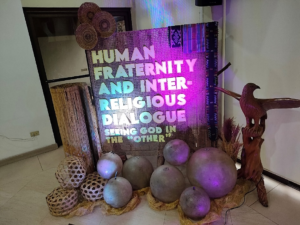
Multifaith Prayers Commenced the Sessions
Multifaith prayer is intrinsically a vital aspect of the dialogue, said Balance-Kupang who introduced the prayer leaders. The experience of multifaith prayer is an opportunity to build and nurture interreligious relationships, a gift. Religious experience at the level of prayer involves a journey into the profound depths of the individual and the community.
In the spirit of inclusivity and respectful presence, the participants felt the holy in the religious representative/s as they expressed prayer offerings in their respective faith traditions. There was an appreciation of the rich diversity of humankind’s spiritual traditions. The collected prayers were put together by Bro. John Ervin Felix which you can access in this link: https://www.youtube.com/watch?v=PAZgvkBBTBc.
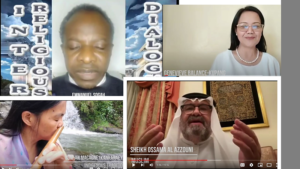
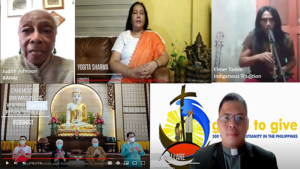
Prayer Leaders. L CW: Emmanuel Sogah (Catholic), Genevieve Balance Kupang (introduced the prayer leaders); Judith Johnson, (Bahai); Yogita Sharma (Hindu); Elmer Tadeo (Tinggian-Indigenous); John Mallare (representing the organizers); Ven. Jue Chi, Luisa So, Patrick Tanunliong, and Chad Moscare (Buddhists); Ossama Al Azzouni (Muslim); Dom-an Macagne (Kankanaey- Indigenous).
Fr. Jessie Hechanova, CICM (RP Provincial Superior) Welcomed the Participants
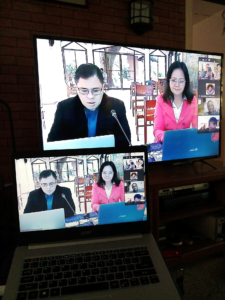
Fr. John Mallare, co-chair of the IRD webinar, introducing Fr. Jessie Hechanova and Bishop Edwin de la Pea. He co-facilitated with Genevieve Balance Kupang for the four-days IRD webinar/Workshop. Photo credit: Kans Jenal

Fr. Jessie Hechanova, CICM gave the welcome address
Fr. Jessie Hechanova, CICM affectionately welcomed the participants and introduced the theme of the webinar “Human Fraternity and Interreligious Dialogue: Seeing God in the ‘Other.’ He said that at the heart of the relationship between human fraternity and inter-religious dialogue is recognizing the presence of the “Holy” in one another. He emphasized the four forms of dialogue: 1) The dialogue of life; 2) The dialogue of action; 3) The dialogue of theological exchange, and 4) The dialogue of religious experience. By assuming an attitude inspired by the spirit of fraternity, friendship, and fellowship, we can hope and strive together for a renewed sense of meaningful encounter with one another. That makes cooperation in the work for justice and peace possible, resulting in creating an inclusive society.
He concluded by highlighting that CICM takes IRD and cultural dialogue a priority. IRD is an integral part of Justice, Peace, and Integrity of Creation. It is a valued opportunity for carrying out the mission of sharing the joy of the Gospel to every society where the CICM missionaries are sent.
Bishop Edwin Dela Pena’s Keynote Address
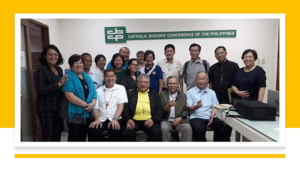
This picture was shared with the participants to introduce His Excellency Most Rev. Edwin A. De La Peña, MSP, D.D., Chair of the CBCP-ECID before his Keynote Address. With him are members and collaborators of the ECID.
The Bishop Prelate of Marawi and Chair of CBCP Episcopal Commission on Interreligious Dialogue (CBCP-ECID) started his talk by remembering the CICMs who worked in Marawi but needed to pull out because of some difficulties. He said that human fraternity can be a fulfilling experience when we engage intentionally and actively with one another. “At the very heart of our humanity, we are all brothers and sisters. We came from the same source, the same God.”
He talked about the late Bishop Bienvenido Tudtud, Marawi’s first Bishop who established the prelature on December 8, 1976. “The primary problem is we do not understand each other. We need to know more about Islam and Muslims. The Christians must be the first ones to offer the hand of reconciliation and forgiveness. The pains and wounds that are still fresh, however, make the reconciliation process difficult. But the Pope emphasized that we need to rise above our biases and prejudices.” De La Peña stressed the need to have these three tracks in dialogue: 1) Interaction with the Muslims/ immersion–we cannot dialogue from a distance; 2) We must form our people and educate them about IRD, and 3) The need for contemplation and prayer.”
Correspondingly, he highlighted that for the first 25 years, IRD was a difficult ministry and apostolate because of the priests and lay collaborators who experienced kidnapping. Nonetheless, beyond these unfortunate events were first-hand experiences of Muslim hospitality and the Maranao culture.
Though the work is challenging, he is still persistent because it is what God wants him to do. In 2001–the 25th anniversary of the establishment of the prelature of Marawi, 9/11 happened. The Muslims were frightened, and it became an avenue for them to promote that Islam is a religion of peace. That was when they also responded to the call of dialogue. They realize that IRD is not only good for Christians but also good for Muslims. To realize this vision, there is a need to work hand in hand. “Peace is still a work in progress. IRD is one step forward and two steps backward. We are not moving any further, but we need to continue because this is what God wants us to do.”
Another tragic event happened last May 2017 when the extremists attacked Marawi. Both Christians and Muslims suffered together because of loss of lives, displacement, and destruction of properties. More than ever, Muslims and Christians have experienced violence and extremism. All stakeholders realized the need to work together against extremism. The Duyog Marawi, ‘a faith-based organization that is an IRD response to the Marawi crisis is one example where the Muslims and Christians are working together for the same goal. He underscored that he and his collaborators will always remain faithful to their charism–the advocacy for peace everywhere. He concluded by urging the participant to “Come and See!” It was his invitation to each one to get involved in IRD.
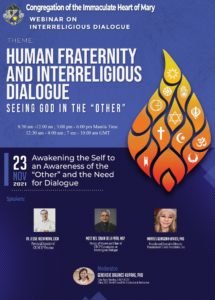
The Harmony Song by the Silsilah Dialogue Movement was sung to end the morning session. Credit: John Ervin Felix
The Challenge of Being Christian among “Others” in the World Today
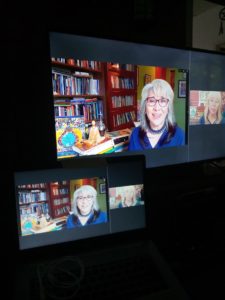
Dr. Africa sharing “the challenge of being a Christian among ‘others’ in the world today.” Photo credit: Kans Jenal
Marites Guingona – Africa, Ph.D., the Founder/Executive Director of the Peacemakers’ Circle Foundation Inc. was the resource speaker in the afternoon. Relating the humble beginnings of her IRD ministry, she said “To be an aspiring peacemaker, we need to go out. We don’t have to go to Mindanao to help, but we can start here in Metro Manila.” She then shared a video “In the light of the Crescent Moon: A Peacemaker’s Story” that voiced the stories of Muslims fleeing to Manila to seek better opportunities for their families. The problem of poverty, discrimination, and prejudices experienced by the Muslims in Manila were underscored. Her Foundation helped build better Christian-Muslim relations.
Dialogue as a Means of Building Harmonious Interreligious Relationships
Dr. Africa also shared the Challenges of engaging in IRD: Fear, Ignorance, Prejudice, Indifference, Poverty, Conflict, Lack of knowledge, and Lack of Trust. The Response they did were Dialogue, Presence of another/third party to bridge the gap and Humanize Not demonize. She likewise discussed religious extremism and the challenge of fear- the fear of the unknown and what we cannot grasp.
There is a lot of fear happening around us every day. Fear is the greatest challenge of a relationship. The opposite of fear is love and is embodied by Jesus on the cross. Love is a choice and not just a feeling. Jesus chose to die on the cross. It is a choice to love. God is experienced from the heart of faith in ways that are life-giving and all-embracing; an attitude of love and respect for others is made manifest through self-sacrificing ways.
The video about Fratelli Tutti was shown to have a sense of what dialogue means. Like Bishop Edwin, she said that “engaging in Interreligious Dialogue is not easy, but we need to reach out to one another in the spirit of mutual respect. Dialogue is not merely the exchange of words, but it is an experience of the heart. One needs to go for a conversion of the heart.”
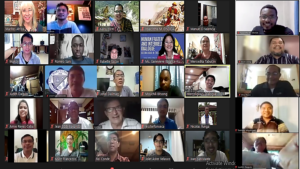
The resource speaker Dr. Africa with some participants.
Dialogue is a way of life, a day-to-day experience in a humble way to encounter our neighbor. IRD is an experience of the other “self,” which includes beliefs and practices so communion may happen. It is breaking free from fear and choosing to take the risk. There is intentional encounter and interaction among members of different religions. In the context of interfaith peacebuilding, dialogue is a way of being in relationship with oneself, God, others, and creation.
For her, to engage in IRD is to embody Christ’ love in our relationships with fellow human beings, just as Christ embodied God’s message of love for humankind. She shared the guidelines for Heart Listening in Dialogue espoused by Kay Lindhal: 1. Be fully present. 2 Shift the focus of attention from the ‘self’ to the ‘other.’ 3. Listen and speak without judgment. 4. Suspend status. 5. Honor confidentiality. 6. Express your personal response. 7. Listen for understanding. 8. Honor silence and time for reflection. and 9. One person speaks at a time. Africa concluded by stressing that dialogue is listening rightly and accepting our differences.
The Peacemakers’ Prayer capped the afternoon, led by Balance-Kupang.
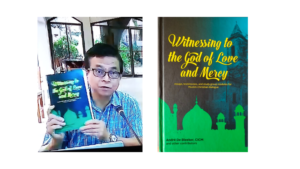
Fr. Castillo sharing the published book “Witnessing to the God of Love and Mercy: Essays, testimonies, and study group modules for Muslim-Christian dialogue,” penned by Andre De Bleecker and other contributors.
——————————————————————————————-
About the Authors:
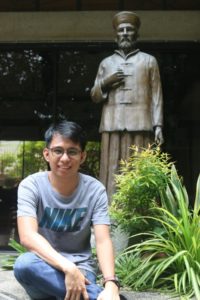
Ferdinand Q. Marcos, CICM is a native of Sto. Niño (Faire), Cagayan; a member of CICM-Asia International Formation Community and second year Theology at the Maryhill School of Theology.
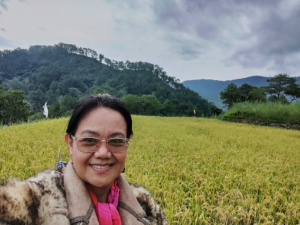
| Genevieve Balance Kupang is lay associate of the Episcopal Commission on Interreligious Dialogue of the Catholic Bishops Conference of the Philippines; Chair of the Special Interest Groups of the World Council for Curriculum and Instruction; a researcher, resource person, consultant, author, and has a career in the academe and NGOs. |


